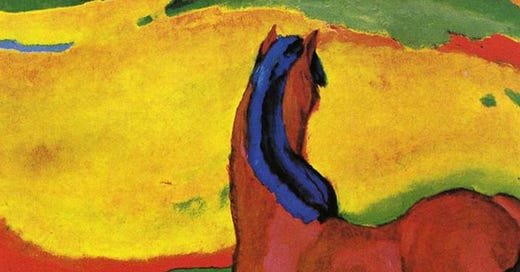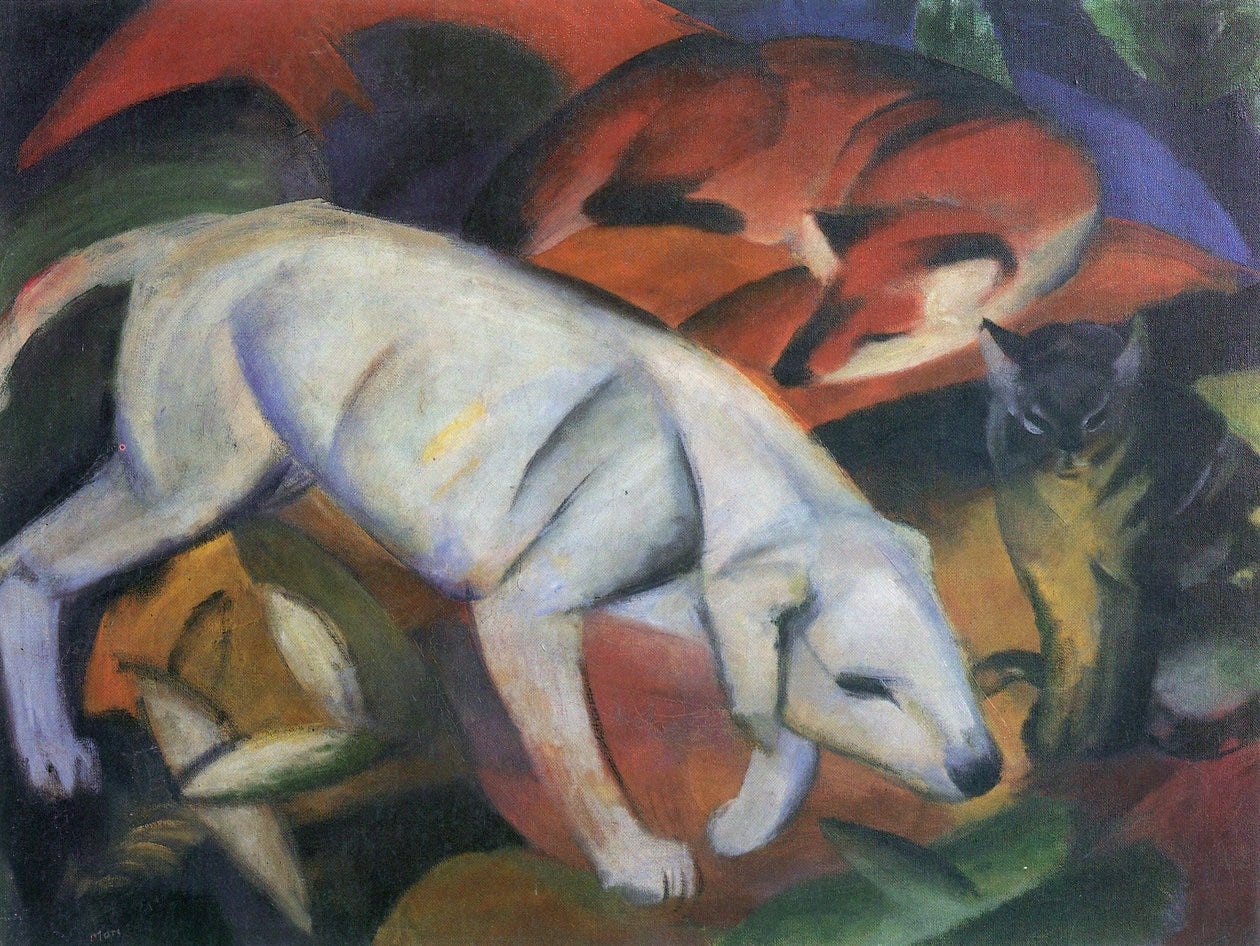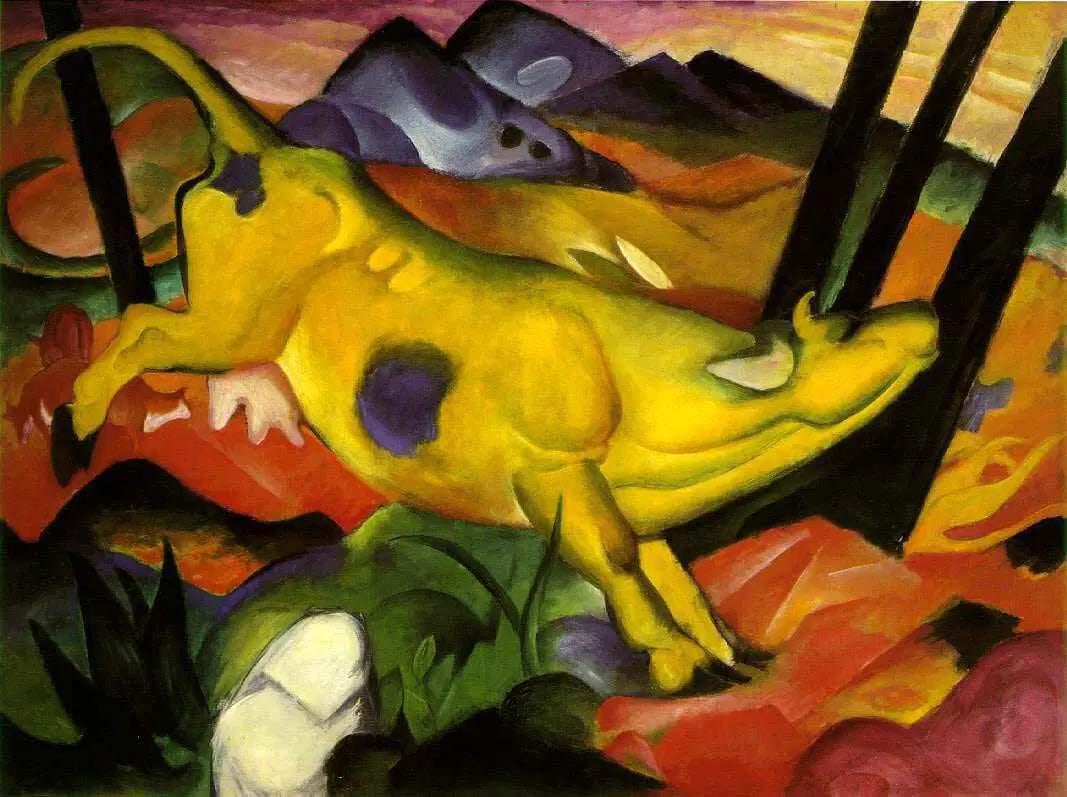Humans and animals are ‘equal’ to each other in that every animal (or species) has its own strength or ‘superiority’,1 something it does better than any other animal. If we use agility as a measure of superiority, then humans are far below squirrels, if physical sensitivity is the scale, we’re smashed by catfish, when it comes to courage, we can be at least equalled by the little wren. Humans are also equal to animals in that we evidently are animals. Although the unnatural world prevents us from getting good at apeishness in the wild—at spontaneity, physical sensitivity, hardiness, animal beauty, group intimacy and connection to our home—apes we are, and, difficult as it is for most of us to believe, wild as well.
Humans are also ‘equal’ to animals in that all animals are conscious to some degree. They all feel some kind of joy, delight, love and pain, including what we would call acute visceral pain. It’s dreadful for anyone with any sensitivity to watch an animal suffer, it’s heartbreaking to see the extraordinary grief of higher animals, it’s inspiring to see the lengths that they will go to avoid this pain and to protect their own, and it’s depressing to hear a scientist anthropomorphically ‘explain’ a bird singing as ‘a declaration of territory’ or the playfulness of a joyous dog as some kind of bonding behaviour; as if there can’t be two or three reasons, as if birds don’t feel pleasure in their song or dogs joy in their social existence.
Ultimately, animals, humans, plants and rocks all have the same qualitative ‘interiority’—the thing-in-itself, towards which primal cultures have a range of attitudes that dispense with rigid distinctions between nature and culture. These attitudes are founded on the assumption that, when we are not looking at them, magpies are playing cellos and jaguars racing go-carts. Recognition of this common ground is why human beings love stories in which animals speak and think as we do, and why cultures which do not are invariably culturally and spiritually arid.
Modern, civilised thinking attempts to eradicate the identity of nature and culture, the staggering oneness of the whole of nature, by reducing nature to a system of cultural tokens, or by bringing culture down to a consequence of genetic-environmental determinants. Such deracinated thought has to ignore the common ground of man and beast and, in doing so, blur distinctions between the manifestation of the thing-in-itself in nature, the self, which obviously exists in hierarchical gradation. Human selves are more conscious than gorilla selves, gorilla selves are more conscious than mollusc selves, mollusc selves are more conscious than poppy selves, and poppy selves are more conscious than pebble selves.
This does not mean that human beings are separate from or outside of nature (and so forced to contend with and dominate it), and it certainly does not mean that it is our much vaunted abstract ‘intelligence’ that puts us in a position of superiority.2 It means that the capacity of the self to experience the thing-in-itself has evolved, with human beings at the pinnacle of conscious manifestation in the natural world. It’s not a popular idea among solipsists, postmodernists and masochists, but it remains true that human selves are more conscious than animal selves. That:
No animal feels wonder at its own existence, wets itself laughing or weeps tears of complete psychological rupture. We know this by attending to animals, which express their inner life just as clearly—if not more clearly—than humans do, and by attending to our own conscious experience, the source of the intense wonder, hilarity and sorrow that are denied animals, along with the fears, desires, frustrations and physical pleasures we evidently do have in common.
Cats, apes and elephants do not suffer as much as humans. Cats with two legs don’t give a toss. Worms don’t suffer as much as rats—have you ever seen a worm grieve? Courgettes do not suffer as much as worms, and bacteria can hardly be said to suffer at all. The Spider Wasp, which paralyses spiders and lays its eggs in them, which then hatch out and eat it from the inside, is often given as an example of the pitiless cruelty of nature; but the spider does not suffer as much as ‘caring’ people like to anthropomorphically think it does.
Humans can feel more than any other animal. In fact some humans can feel more than other humans. Unfeeling humans we rightly disparage as animals; perhaps not as unfeeling, say, as baby orangutans, but at least as ‘brutish’ as snakes or beetles or worms, all of which are, quite naturally, terms of insult for us.3 This doesn’t mean that beetles and worms are hateful, stupid, disgusting; it means they are less conscious than we are. Just as there is a scale of conscious sensitivity in the animal world, so there is in the human world, at the bottom of which are those people who do not really feel wonder (everything around them strikes them as unremarkable; only the valuable and the threatening worthy of note) or joy (excitement at getting and winning takes its place, although the basest humans don’t feel much excitement either) or sorrow (mere depression and anxiety, or numbed nothingness), who don’t laugh very often (certainly not as much as they did when they were children, and even then not very much) or cry very deeply (if at all, perhaps every now and then when a few crude, sentimental drama-buttons are pushed) or react to loud noise, harsh light and clashing colours. Actually, this could be most people, but there’s still a scale, the existence of which translates, at least analogously, into animal experience, which is why we often consider animals ethically superior to human beings, why those towards the bottom of the scale say, or would say if they considered such things, that ‘animals and humans feel the same’ (because they can feel nothing deeper than an animal can) and why those capable of genuine empathy feel gutted if they run over a deer, troubled, perhaps upset, if they kill a mouse, momentarily sickened if they step on a snail and completely unconcerned about pulling up a dandelion plant to make way for some carrots. Because in our actual lives we recognise, despite what we like to tell ourselves, a hierarchy in nature.
Animals, less free than humans, are more susceptible to addiction. Caged animals are particularly prone. Children, also less conscious (and less able to see a qualitative difference between humans and animals) are also more prone to addiction, as are caged humans. Men in cages—in the things that we call ‘houses’—spend as much time masturbating as caged apes. Wild animals, like wild humans, rarely self-pleasure.
Humans are, or at least potentially are, more individual than animals, which are more individual than plants, which are, in turn, more individual than minerals. This is because, as Schopenhauer observed, each has successively more freedom of will; minerals are governed by cause and effect, plants by stimulus and response, animals by awareness and motive4 and humans by conscious feeling and conceptual thought, projected far into the past and future, all of which leads to finer and finer degrees of individuality, manifest in the gloriously individual human face. This is why, again as the animal-loving Schopenhauer realised, where animals exercise barely any discrimination between mates, this discrimination in human beings is ‘instinctively and unreflectively pursued to the point of violent passion’. It’s also why character in animals—although unquestionably there, and loveable with it—is fainter than in humans and gets fainter and fainter the further down you travel, from the reasonably distinct character of apes, cats, elephants and cockatoos, down to the much vaguer individuality of pigeons, lizards and fish (which is, as anyone who lives with such creatures is well aware, also there), down to the practically non-existent character-distinction between one bee and another, or one aspidistra and another.
We don’t feel too guilty about domesticating animals, which is essentially slavery. To domesticate a dog you have to force the wildness out of him. That this is not a particularly difficult job—dogs have been so trained for forty-odd thousand years—doesn’t alter the fact that dogs are trained to be our slaves, and nobody cares, as, of course, they shouldn’t. Imagine treating a human being that way though. That human beings are often considered in need of domestication and that we have the wild beaten out of us, sometimes literally so, doesn’t change the fact that having a child at your complete beck and call, pulling it around on a string and delighting in its ability to do demeaning tricks for you would be considered monstrous—because we all understand that animals have less psychological independence than human beings, are less conscious, less free and suffer less.
It’s okay to eat animals. It is not morally wrong. If we assume that the animal has lived a good life, ideally in the wild, and is killed humanely (i.e. as a human being is capable of doing, not tearing it apart with our teeth), there is nothing immoral in killing and eating it. Every animal on earth eats something which is beneath it. Again, that animals do not live happily in the human world, that keeping them for our food in the industrial system is as cruel as it is ecologically destructive, that people who treat animals as walking kebabs are monsters, that a mostly vegan diet is both healthy and natural, that there is something repulsive about putting flesh in your mouth (try eating bacon when you’re in a state of radically self-softened sensitivity); none of this alters the fact that, firstly, the most ecologically balanced societies that have ever lived, or that ever could, namely small primal bands, are all omnivorous5 (a vegan diet is, for the most part, a civilised diet) as the human body is; and, secondly, that a slaughtered animal does not suffer as we anthropomorphically take it to suffer.
Thus, intimacy and love are possible between humans and non-humans. Humans can gaze in trust into gorilla’s eyes, share jokes with crows and receive loving reassurance from horses, but the most conscious will always seek the company of conscious human beings before they seek the company of animals. The reason why aggressive, ethically superior vegans narcissistically fawn over animals, why dog ownership is practically a fetish (reaching the height of creepy deviance in dog-shows like Crufts), why men with unconscious anxiety about their sexual potency seek to possess lions and tigers, why many consider their love for their pets to be equal to that for their friends, family and lovers, and why some people (often appallingly cynical6) practically worship animals,7 is not because animals are as loveable as humans—they are not—but because humans can no longer love each other. If we could, we would love animals more.
In our unconsciousness we sentimentalise nature, and, in erasing our difference to the animal world, cut ourselves off from it even more completely.
This is an extended and edited extract from Self and Unself, a radical philosophy of all and everything, which presents the irrational root that this little shrub grows from.
The word ‘superior’ (and ‘equal’) strikes fear into the rationalist (particularly the hyper-educated, middle-class), because they have no idea what words which refer to an actually existing quality can possibly refer to. This fear manifests as a kind of anxiety when they read or hear of love as it actually is, or beauty, or truth, or meaning, an anxiety then restlessly seeks a reason for its own existence, something which, faced with responsible expressions of quality, can justify its outrage (‘your terms are too vague!’ ‘you’re an ethical supremacist!’ ‘where’s the argument!’ and so on) and provide a reassuring reason why it need not pay attention, or, why a mercilessly violent personal attack is warranted.
The power to think in three abstract dimensions, is a consequence of human consciousness. Male thinkers have preferred to believe that consciousness is a consequence of rationality so as to justify an unconscious, and wicked, rational dominance of nature, which, in their unconsciousness, they cannot participate in; for much the same reason they cannot immerse themselves daily in the ocean of love inside their wives’ petticoats.
Although the use of the word ‘pig’ to insult someone’s intelligence or honour can only be made by someone who has not spent quality time with a pig.
An awareness which, incidentally, puts the lie to Kant’s idiotic conflation of awareness with abstract thought.
Or, if you prefer, ‘frugivorous’; principally eating fruit and vegetables, supplemented with meat.
Sentimentality, as I have noted before, is the consolation of cynicism (or as Adorno and Horkheimer had it, the obverse of sadism). The most bitterly cynical people — which, today, tends to mean hyper-rationalist brains-in-jars — are often obsessed with plants and animals. Such people are unable to love their fellow man (specifically, their partners), or anything finer than their own desires, so all of their ethical attention is focused on animals. Other popular outlets for the thwarted love of the cynic, aside from animals, include babies, art, the nation, the club and religious authority. See The Snob and the Philistine for further discussion.
Obviously I am referring here to biological entities, not to the mythical avatars referred to above.





